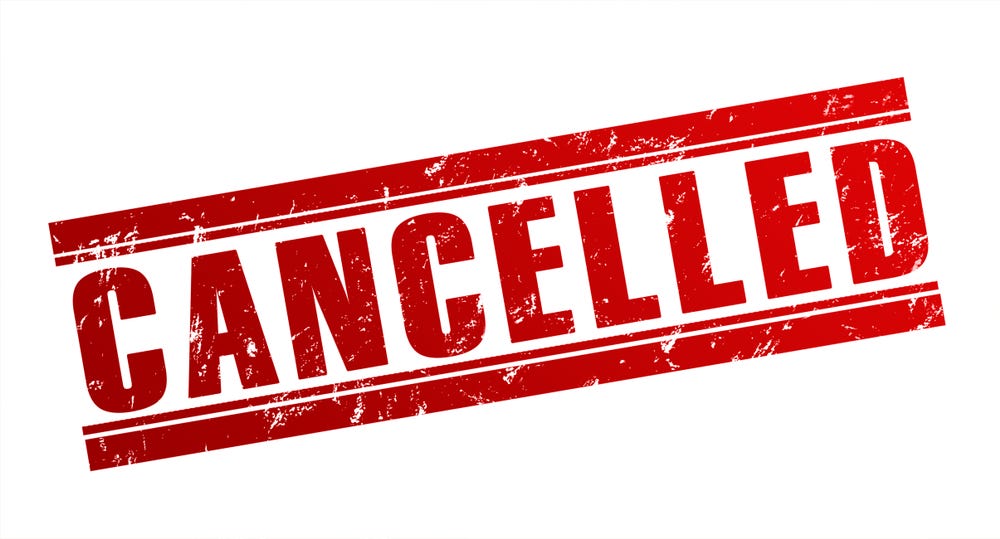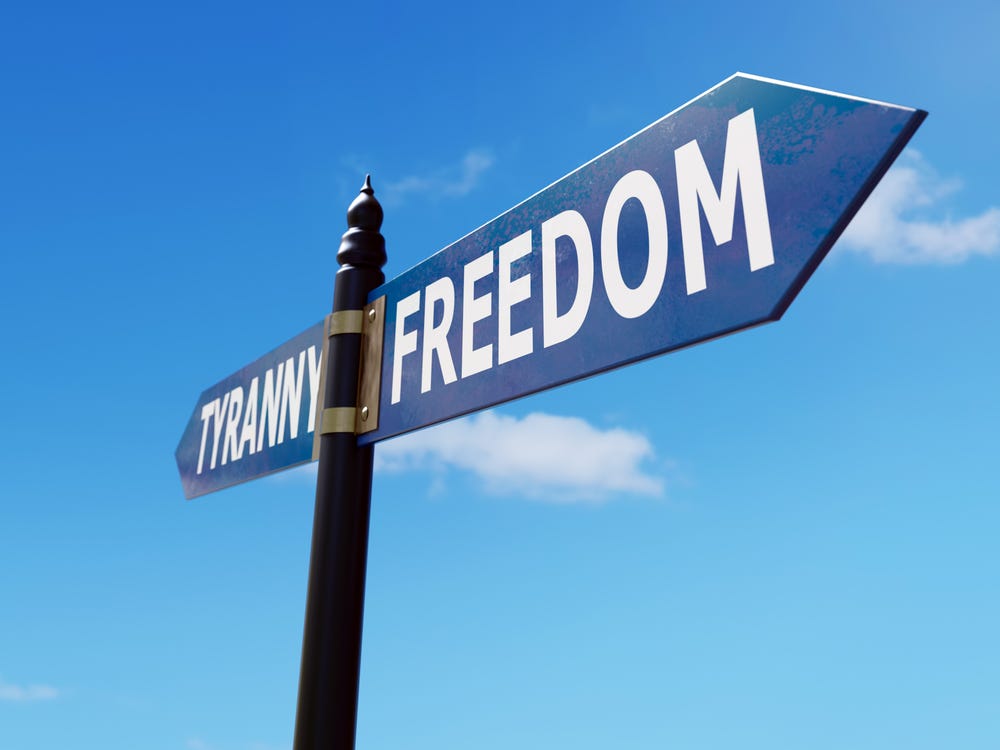E-Pluribus | November 15, 2021
The danger of wokeness, what the 2021 elections should tell Democrats, and why does humanity lean towards authoritarianism.
A round up of the latest and best writing and musings on the rise of illiberalism in the public discourse:
Cathy Young: The "Woke" Revolution and the Threat to Liberalism
In something of a response to fellow Arc Digital writer Nicholas Grossman’s recent essay on comparisons to present day America and China's Cultural Revolution (featured here at Pluribus on November 3rd, item 1), Cathy Young argues that while not every individual “cancellation” amounts to an existential crisis for our society, the trend is nonetheless concerning and should not be downplayed. The chilling effect of the phenomenon and the support that such episodes sometimes garner from mainstream outlets and pundits could result in illiberal attitudes and activities becoming more entrenched than might at first be apparent.
The problem, of course, is that the chilly climate related to the cultural shifts of the last decade—specifically, heightened sensitivity to inequities and insults related to race/ethnicity, sex, sexuality, gender identity, etc.—is extremely hard to measure. Some have cited polls showing that conservatives feel more inhibited than liberals about expressing their opinions; others have said that these polls show nothing useful. Grossman suggests that skittish conservatives are more intimidated by reports of “cancel culture” in the right-wing media than by “cancel culture’s” actual existence. No doubt this is sometimes true. By the same token, one could argue that women and racial minorities who say that sexism and racism are serious problems are reacting more to the mainstream media’s constant litany of alarm about sexism and racism than to their own “lived experience.” This is also sometimes true.
In addition, the problem is much bigger than conservatives feeling there is a hostile climate for their opinions. As I noted in my recent piece on “cancel culture” in The Bulwark, many “cancellation” episodes are directed at liberals and progressives who have transgressed against “woke” orthodoxy—whether by failing to embrace a newly required opinion or by transgressing against new social codes. Grossman points out that according to a Cato Institute survey, the increase in people agreeing that “the political climate these days prevents me from saying things I believe because others might find them offensive” from August 2017 to July 2020 was largest among self-proclaimed “strong liberals” (from 30 percent to 42 percent) and smallest among “strong conservatives” (from 76 percent to 77 percent); among all other groups, the increase was seven percentage points. Grossman suggests that the growth in “political climate”-related self-censorship among “strong liberals” is likely due to Trumpism; but this shift could also be primarily among liberals who have reservations about some aspects of progressive dogma—e.g. the Black Lives Matter movement, or transgender issues.
[…]
Absent convincing evidence from surveys, when does the plural of anecdotes become data? Grossman, like other critics of the “cancel culture” narrative such as Liberal Currents’ Adam Gurri, sees evidence of the relative rarity of the problem in the small number of disinvitations and other “targeting” or “cancellation” incidents in academia as chronicled by the Foundation for Individual Rights in Education and the National Association of Scholars. But for one thing, the NAS list is far from complete. […]
Read the whole thing.
Peggy Noonan: Democrats Need to Face Down the Woke
Peggy Noonan of the Wall Street Journal weighs in on the results of the recent elections and the message voters, especially the working class and parents, were sending. Noonan notes dissension even from within the Left on the issues (Jacobin magazine!) and says that Democrats disregard these warning signs at their own peril.
The debate over nomenclature—why, critical race theory isn’t even taught in third grade!—is mischievous and meant to obscure. The woke regime rests primarily on a charge that racial evil was systemically and deliberately embedded long ago, by the white patriarchy, in the heart of all American life, and that this ugliness thrives undiminished, which justifies all present attempts at eradication. We are not individual persons with souls; we are part of identity groups marked by specific traits. We hate each other and must fight each other. This regime is variously compared to China’s Cultural Revolution, the French Revolution’s Terror and Puritanism. It is an ideology. A philosophy bubbles up from lived experience and emerges in time; an ideology is forced down into people’s heads from above, and its demands are always urgent.
An important piece appeared in the Washington Post this week by Virginia public school mothers Tiffany Justice and Tina Descovich. They wrote that the antiwoke movement among parents is driven by many things—mask mandates, reading materials, critical race theory—but is about something “more profound.” When parents “were suddenly within earshot” of online classes, they became alarmed that children were “being fed lessons on highly divisive topics of questionable academic benefit.” But when parents began to push back, they discovered who really runs the schools: unions, school boards whose members are often handpicked by unions, and businesses that sell curriculums and textbooks. “None of them put students’ interests first.”
Read it all.
Peter Hughes: The Temptations of Tyranny
In a deep 2000-word piece at Quillette touching on everything from Dostoevsky to the founding fathers to anthropology to Maoist China, philosopher Peter Hughes explores the human tendency towards authoritarianism. Individual responsibility, though it may register as selfishness on some level, is the ultimate key to maintaining a check on the urge to subjugate and dominate others through group identities.
The explanation for this descent into tyranny is to be found in our nature. Today, as human bodies appear to be little more than abstractions, it is impolite to discuss the nature of our species. However, as Shigalyov and Rae Yang discovered, the desire for an ideal to be true does not make it so. In his remarkable book, Hierarchy in the Forest, the anthropologist Christopher Boehm reflects on the inevitable failure of the Communist ideal. In his exploration of dominance hierarchies among chimpanzees, human foragers, and tribal societies, Boehm concludes that Marxism led to terror because its “social engineering was inept: the blueprint was not laid out with an accurate view of human political nature.” Human beings, he went on, have always lived with “some kind of hierarchy,” and the desire to erase them misreads our nature. When this ignorance is tied to an ideology that essentialises group identity and collectivises guilt, the result is the tyrannical exercise of power clothed in the garments of freedom and justice. Such ideologies are always accompanied by an eschatology of liberation—when class enemies, the bourgeoisie, white supremacists, or patriarchs are defeated, perpetual peace will reign on Earth.
As Boehm notes, despite its disastrous impracticality and scientific naivety, this collectivist ideal captures “the hearts of resentful underdogs everywhere,” who imagine that, by casting off their oppressors, they can end oppression itself. A glance at any moment in history should be sufficient to refute that assumption. To take one of countless examples, a 2,000 year old Vedic text known as Manusmriti divides people into four castes—Priests, Warriors, Merchants, and Servants—and more than 30,000 sub-castes. Beneath these castes lie the Dalit (literally, the “crushed” or the “broken”). They are the wretched foundation upon which the entire edifice of caste is built. Yet even the lower will, when opportunity arises, exact vengeance on the lowest. In 2002, inter-communal violence in Gujarat led to a massacre of Muslims by Hindus. Dalits and members of indigenous tribes were bussed in to participate in the massacre. Reflecting on these events in Field Notes on Democracy, Arundhati Roy observed that those who have been “despised, oppressed and treated worse than refuse by the upper castes for thousands of years, have joined hands with their oppressors, to turn on those who are only marginally less unfortunate.”
Read it all here.
Around Twitter
Noam Blum makes the point that overcoming “cancel culture” doesn’t disprove its existence or danger:
Glenn Greenwald with an observation about why Substack has become such a lightning rod for criticism from the corporate media:
Also via Greenwald, the ACLU issues a statement of concern, albeit through gritted teeth, over press freedom and the FBI raid of Project Veritas:
And finally, another woke-abulary lesson from Peter Boghossian:









